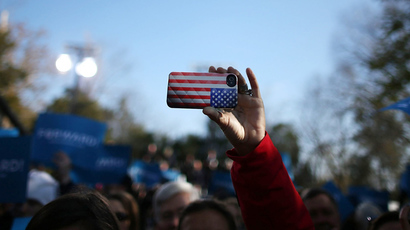New Jersey bans ‘ATHEIST’ vanity plate, calls it 'offensive'

The New Jersey Motor Vehicle Commission has rejected an application for a personalized license plate that says “ATHE1ST” – even though the word is not on the state’s list of offensive and prohibited terms.
New Jersey resident David Silverman, president of the group American Atheists, was willing to pay for a personalized license plate that reflects his views on religion. In the state of New Jersey, it costs $50 to acquire a customized license plate. But the MVC rejected his application, claiming that the word “atheist” is offensive, Silverman tweeted after the incident.
My vanity "ATHEIST" license plate was just refused by the state. Reason: It's offensive. #wronganswer
— David Silverman (@MrAtheistPants) August 26, 2013
Earlier this year, the New Jersey Star-Ledger published the list of words that the MVC refuses to print on license plates. But the list, which has a total of 1,085 words and is dated Nov. 26, 2012, does not include the word atheist.
MVC spokesman Mike Horan told the paper that personalized license plate applications are evaluated on a case-by-case basis, especially since new slang words are continuously arising.
“The language is ever evolving,” Horan said. “Slang terms and things that might have been pretty innocuous years ago, now might actually have a meaning at this point in time.”
But the word atheist is neither new, nor slang – and versions of it can be found on license plates in other US states, such as the Midwestern state of Minnesota, where 81 percent of the population is affiliated with a Christian religion. Furthermore, New Jersey has printed customized license plates such as “1M2SEXY,” “CLIMAXX,” “IAMGOD,” and “BIOCH,” which could be considered more offensive than “ATHE1ST,” the American Atheists wrote on its website.
The MVC has previously also approved the license plate “ATHEIST,” which varies from Silverman’s application because it contains an “I” instead of a “1”. That license plate his since been retired.
Silverman’s group, the American Atheists, has fought to uphold the civil liberties of non-religious believers since it was established in 1963. The non-profit advocates for the separation of church and state and has won numerous court cases and lawsuits. Silverman has filed an appeal with the MVC, but if his application is rejected a second time, it is possible that the American Atheists will take legal action, given the organization’s track record.
The case closely mirrors several other instances in which registered car owners have been denied the right to have non-religious terms printed on their license plates.
In 2010, North Dakota radio host Brian Magee applied for a license plate that reads “Is No God”, which reflects his non-religious views. Magee, who hosts a show called Amplified Atheist, applied for the customized license plate in response to seeing plates that read, “I love God” and “Praise God.”
But North Dakota Driver and Vehicle Services rejected the anti-religious license plate, claiming that it was offensive, WDAY-TV reported. After the media caught wind of the story and Magee appealed the decision, DOT Director Francis Ziegler allowed the radio host to obtain the atheist plate.
A similar case occurred in Florida in the year 2002. Gainesville resident Steven Miles had a personalized license plate that said “ATHEIST”, but unspecified complaints prompted the Department of Highway Safety and Motor Vehicles to declare the tag “obscene or objectionable” and ordered the man to give it up. Miles called the American Civil Liberties Union for help, and the DMV eventually decided to let him keep it.
“This is about freedom of speech and freedom of conscience,” Ellen Johnson, a former president of American Atheists, told the St. Petersburg Times at the time.
In his appeal to New Jersey’s MVC, Silverman notes that 15 percent of New Jersey citizens consider themselves atheists, which makes them the third-largest religious demographic in the state. The term is also used to describe non-religious war heroes at the Arlington National Cemetery, which Silverman considers further evidence that the term is not offensive.
“’Religious Freedom’ includes the ability to decline religion; ‘Free Speech’ means we can speak our minds, even when we say things with which others disagree,” Silverman wrote in his appeal. “The First Amendment guarantees both of these rights, which I proudly defend for a living.”














